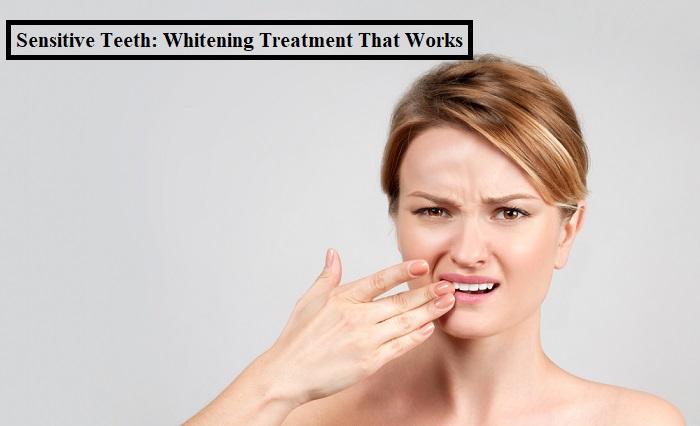
The teeth' sensitivity is an issue faced by most people that opt for teeth whitening to an extent. While some patients may experience a slight pain that disappears quickly, others may have severe pain for a couple of days. It may seem impossible to whiten your teeth because they are sensitive, but there are comfortable treatments. Should this be the case, your dentist W1 Wimpole street can be of help; however, there is a need to know why whitening products exacerbate sensitive teeth.
Why does tooth sensitivity increase with whitening products
The ingredient hydrogen peroxide or carbamide peroxide is added to every product that whitens the teeth. While this ingredient's quantity may be different in at-home and professional whitening procedures, bear in mind that any quantity of this substance can irritate the teeth and cause temporary or permanent tooth sensitivity. As the peroxide spreads to the enamel, it can irritate the dentin's tender layer housing the nerve. When the whitening gel switches naturally from being active to inactive, it exposes the teeth' pores, making the tooth dehydrated. This discomfort will continue until the teeth are hydrated again via saliva production - a process that takes a couple of hours. There are other reasons why the duration and extent of sensitivity may last. Improper use of whitening products and the concentration of peroxide are some reasons.
Consult your dentist on teeth whitening all the time
This is important because before receiving any teeth whitening solution, there has to be a check to identify any underlying dental problem, including cavities and gum disease, which can cause teeth sensitivity. Since many oral concerns are easy to treat, immediately these problems are corrected, the whitening procedure can take place with minimal risk of developing sensitive teeth. Your dentist can help you get the right at-home or professional teeth whitening meant for persons experiencing tooth sensitivity.
The expert teeth whitening solution
The most suitable treatment for sensitive teeth sufferers is professional teeth whitening. This option may indeed cost more than at-home whitening, but the advantage is that a trained expert will be there to supervise the treatment and ensure the safety of your teeth. To help lower the sensitivity, the dentist may apply desensitizers and gels during the whitening procedure. Another fact worthy of note is that an in-office treatment works best in deep stain removal, plus it is more long-lasting than DIY procedures.
Porcelain veneers
For teeth that have been seriously impacted by damage or stain, whitening procedures may not be an effective solution. To restore your teeth, should this be the case, porcelain veneers may come in handy. What is this treatment all about? Not to worry, your dentist will explain comprehensively everything you should know about the procedure, including what you should look out for.
At-home teeth whitening for sensitive teeth
Have your teeth lost their shine and beauty due to stains or damage? A cost-effective solution for tooth restoration is the at-home or DIY treatment. But the issue is that a lot of these over-the-counter teeth whiteners can disturb sensitive teeth and gums, particularly when they are not used according to the directive.
On the market are various types of teeth whitening products ranging from toothpaste, rinses, gels, over-the-counter trays, and strips. You may be confused about which one to go for. But don't forget to check the labels for direction on use and any precautions on sensitivity. The good news is that those who have sensitive teeth can get any special products designed for this particular problem.
Teeth whitening demands self-care to maintain results
That you have whitened your teeth does not mean that they will remain white forever. You have to put in some work to ensure that the outcome lasts long for whatever technique you opt to apply to whiten sensitive teeth.
Always brush and floss your teeth right after eating dark-colored foods or drinks such as pasta sauce, red wine, white wine, tea, coffee, or any tomato-derived food. Drinking dark liquids straight from the cup has the potential to stain your teeth. So, use a straw instead to sip the liquid. It keeps your teeth away from stains. Avoid smoking and the use of other tobacco products. This habit causes teeth stains. Where it is not possible to brush your teeth after eating foods that can stain, rinse your mouth thoroughly with clean, freshwater.
Takeaways
Tooth sensitivity is a problem. If you have this concern, whitening your teeth is not going to be a big deal. Some solutions can treat this dental concern, but first, knowing the causes of sensitive teeth is important to get the best care.
DIY whitening may work for sensitive teeth, but it can also increase the pain of sensitivity. This is why it is advised that you get a professional to whiten your sensitive teeth as they have the correct training to handle any issues that may arise (it rarely does). Another perk is that pro whitening lasts longer than the use of home products. Results even come out faster than when you use at-home techniques.
Book a consultation with us
It is possible for people with sensitive teeth to have whitening treatment. Feel free to reach us at Wimpole Dental Office for teeth whitening in London and treatment of any related dental issue. Our dentists have the right certification and license plus great experience and expertise to ensure you don't feel any discomfort with sensitive teeth whitening.
Also read about:
Fast and Effective Ways to Repay Personal Loan as per your Pocket
McLaren 620R is here now Racetrack Brutality for the Roads
How FOMO Affects Your Investment Decisions and How Can You Overcome










More Stories
8 Natural Beauty Practices for the Smart Girls
7 Beauty Tips that Will Never Go out of Fashion
Things to consider before buying any Skin Care Product
Find Out the Top Lightweight Tops for Women
5 Styling Mistakes That Men Must Avoid
3 Tips about top Video Production Company in Singapore